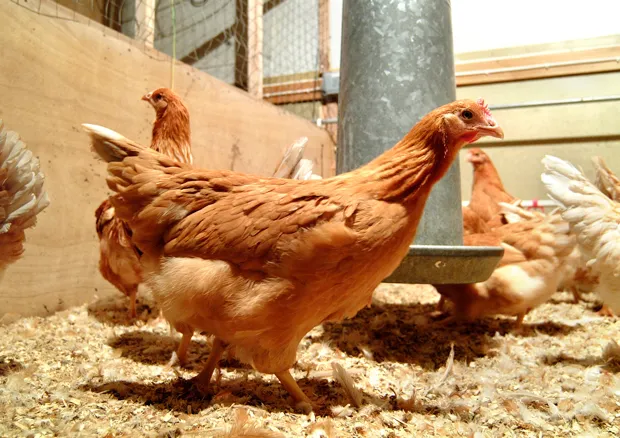Cheaper drugs could be on the way courtesy of chickens that have been genetically engineered to lay eggs containing ingredients for medicines.
It’s no yolk: scientists at the University of Edinburgh’s Roslin Institute have produced genetically modified hens whose eggs carry proteins the human immune system uses to fight disease – the same proteins used to make certain types of drugs, including cancer medication.
The research could pave the way for a cheaper means of mass-producing medicine and the technique has no adverse effects on the chickens. But for the time being any drugs produced would only be used for scientific studies – it’ll take many more studies over many years before any of the medicines can be cleared for use on human patients.
“We are not yet producing medicines for people, but this study shows that chickens are commercially viable for producing proteins suitable for drug-discovery studies and other applications in biotechnology,” said Professor Helen Sang, a developmental biologist at the Rosilin Institute.
Protein-based drugs, such as Avastin and Herceptin, are widely used for treating cancer as well as a number of other diseases. Some of these drugs can only be produced using cell culture techniques in which cells are removed from an animal and then grown in a controlled artificial environment. These are often time consuming, costly and only produce small amounts of useful product. Other methods require complicated systems and additional processing, which bumps up the cost. The researchers say their new approach is more efficient, produces better yields and is more cost-effective.
Once the eggs are laid, large amounts of the desired protein can be extracted using a simple purification system. The protein found in just three eggs is enough to produce a sufficient dose of a given drug. As each chicken can lay up to 300 eggs a year, the process could easily be scaled up to produce large amounts of drugs, the researchers say.

Eggs are already used to grow viruses used for vaccines, such as the flu jab. The viruses are injected into fertilised hen’s eggs and incubated for several days to allow them to replicate before being harvested. But the team at the Roslin Institute went one step further by encoding therapeutic proteins directly in the chicken’s DNA.
Proteins act as the body’s molecular workforce. The researchers concentrated their efforts on two particular proteins essential to the human immune system: IFNalpha2a, which has powerful antiviral and anti-cancer effects; and macrophage-CSF, which is involved in the repair of damaged tissues. The procedure proved effective in both cases – producing enough of the protein for a human dose.
As well as producing drugs for human consumption, the technique could be used for more general research purposes.
Similar results have previously been found by genetically modifying goats and rabbits to produce specific proteins in their milk but the researchers say their new approach using chickens is more efficient.
“We are excited to develop this technology to its full potential, not just for human therapeutics in the future but also in the fields of research and animal health,” said Dr Lisa Herron, Head of the Avian Biopharming Business Unit at Roslin Technologies.
Follow Science Focus onTwitter,Facebook, Instagramand Flipboard
